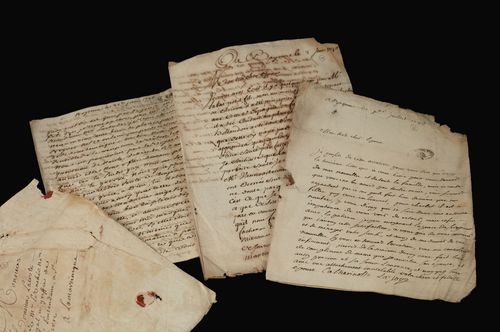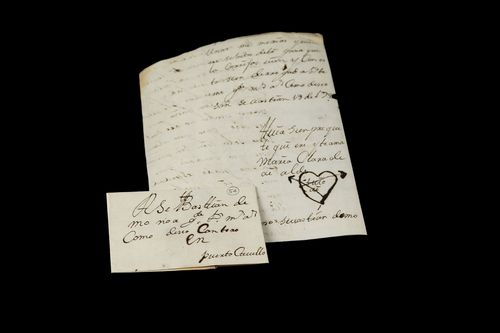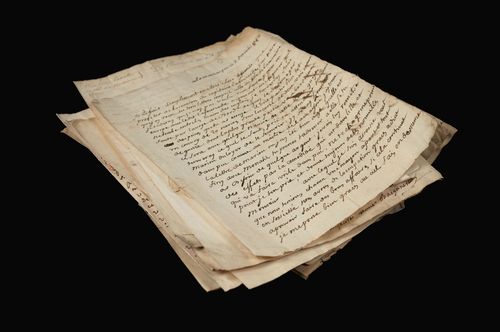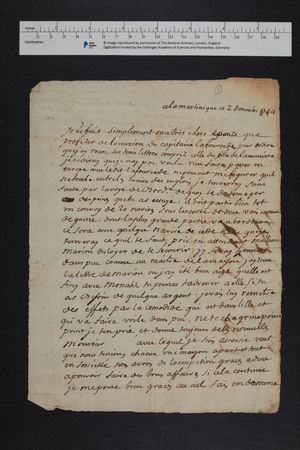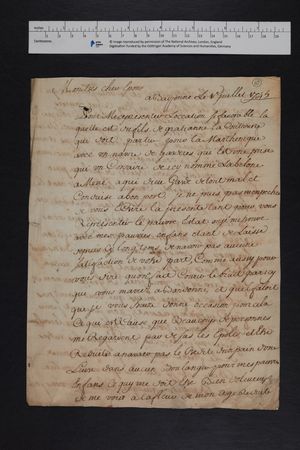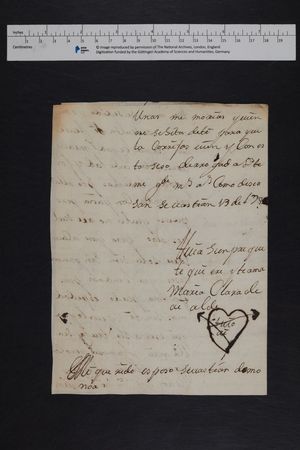La Diligente of Bayonne
La Diligente of Bayonne
The 'Diligente' was a French frigate which was owned by Jean Garderes and commanded by Jean Mathieu Veyres. On 15 July 1745, she set out on a journey from Bayonne to Havana and Martinique with 26 sailors and three passengers on board, however, on 26 July, she was captured by an English privateer, the 'Leviathan', and then taken to Lisbon. Apart from carrying goods – mainly foodstuffs (meat, fish, wine, flour), shoes and a variety of tools – the 'Diligente' also carried about seventy letters from France and Spain.
Discover HCA 32/104/20: La Diligente of Bayonne in TNA Discovery
Browse the documents in the Prize Papers Portal
The 56 Spanish letters were sent from San Sebastián, Pasaia, Azpeitia and Hernani. Some of these letters were intended for important people, such as Joseph de Itturiaga, but the majority were addressed to sailors of the Real Compañía Guipuzcoana de Caracas in Venezuela. These letters written by wives, relatives and friends were supposed to bring news and - in some cases - contained very affectionate greetings. For example, a letter from María Clara de Aialde to her husband contains a drawing of a heart pierced with arrows and a declaration of love: "Tuya siempre que te quiere y te ama”.
The sixteen French letters were addressed to both seamen and longer-term residents of Martinique. They were written by family members or friends, all based in the Bayonne and Biarritz area and concern family or business matters.
One letter, however, stands out as an exception. While all the other letters were written between April and July 1745, this letter is dated December 1744 and was written in Martinique by a certain Jean Roustant to his wife. At first sight, it may seem strange that a letter written in Martinique should be found on a ship bound for the exact same place, however, another letter provides an explanation. This second letter is dated 1 July 1745 and was written in Bayonne by Jannote Roustant - Jean's wife - to her husband who was living in Martinique. She tells him of her increasingly desperate situation, since rumours claim that he has abandoned her and her children: “[…] To tell you also that the rumour has spread here that you have abandoned me and that I had to give you an opportunity to do so, with the result that many people look at me with contempt and that I am reduced to not having credit for a one-pound loaf of bread from any baker for my poor children.” In order to refute these rumours of abandonment, Jannote Roustant was "obliged to write a letter saying that I had received it from you", a copy of which she sent to her husband. Therefore, this strange letter, which stands out from the dozens of others because of its date and place of origin, is in fact a "false letter" which was written in France.
On the basis of this evidence alone, it is impossible to say whether or not Jean Roustant had indeed abandoned his family or if his letters simply had not reached their destination. Indeed, during this period of war, the English privateers captured many French ships - including privateers - which resulted in the interception of the mail on board. The difficulty of communicating between the mainland and the colony is illustrated by several letters found on the 'Diligente'.

by Lisa Magnin
Contact: lisa.magnin@uni-oldenburg.de
Credit: Letters found as mail-in-transit on the ships La Diligente and The John and Constant. TNA, HCA 32/120/13 and HCA 32/104/20, Photo: Maria Cardamone, Prize Papers Project. © Images reproduced by permission of The National Archives, London, England.


